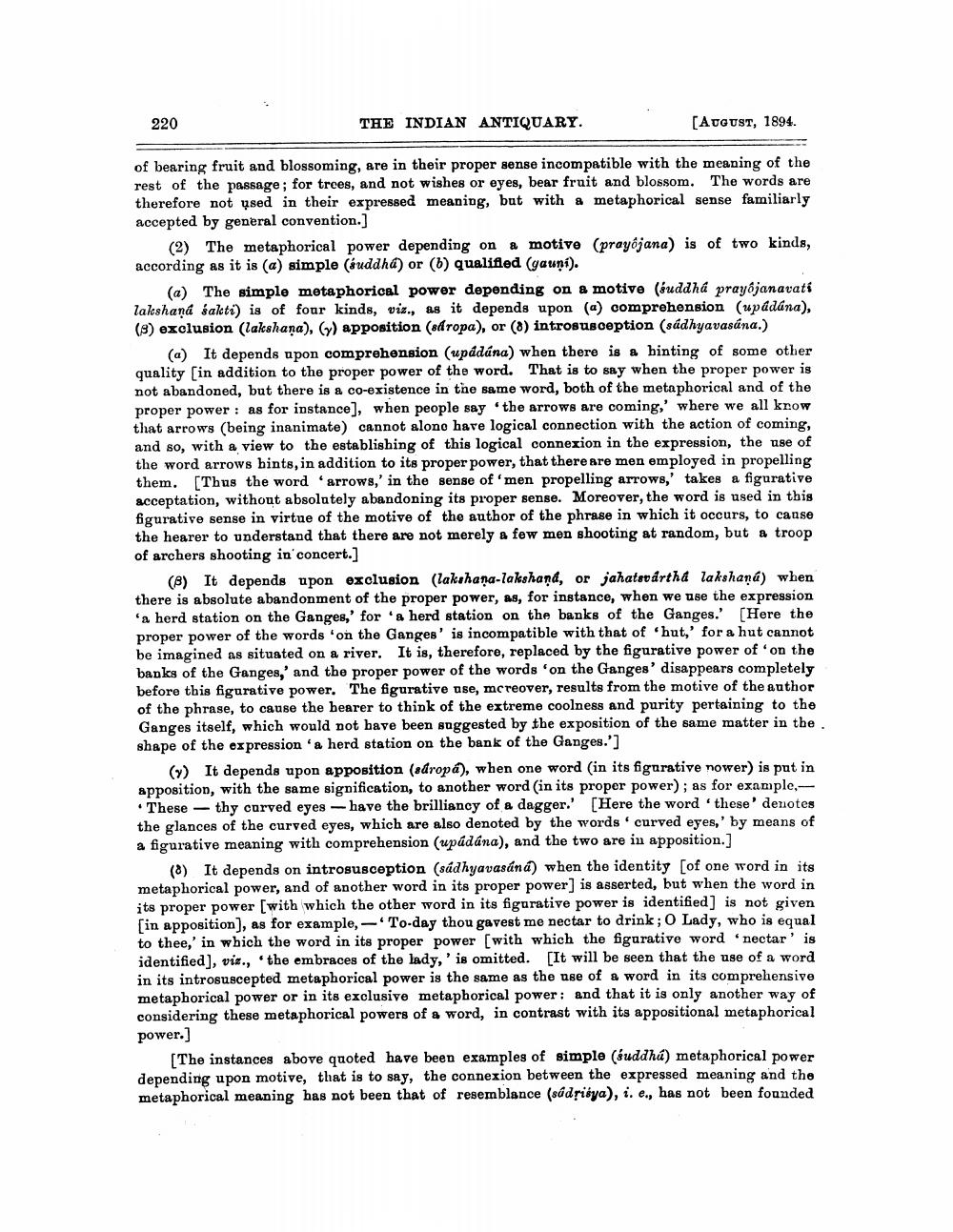________________
220
THE INDIAN ANTIQUARY.
[AUGUST, 1894.
of bearing fruit and blossoming, are in their proper sense incompatible with the meaning of the rest of the passage; for trees, and not wishes or eyes, bear fruit and blossom. The words are therefore not used in their expressed meaning, but with a metaphorical sense familiarly accepted by general convention.]
(2) The metaphorical power depending on a motive (prayojana) is of two kinds, according as it is (a) simple (suddha) or (b) qualified (gauni).
(a) The simple metaphorical power depending on a motive (suddha prayojanavati lakshana sakti) is of four kinds, viz., as it depends upon (a) comprehension (upádána), (8) exclusion (lakshana), (y) apposition (sdropa), or (8) introsusception (sádhyavasana.)
(a) It depends upon comprehension (upádána) when there is a hinting of some other quality [in addition to the proper power of the word. That is to say when the proper power is not abandoned, but there is a co-existence in the same word, both of the metaphorical and of the proper power: as for instance], when people say the arrows are coming,' where we all know that arrows (being inanimate) cannot alone have logical connection with the action of coming, and so, with a view to the establishing of this logical connexion in the expression, the use of the word arrows hints, in addition to its proper power, that there are men employed in propelling them. [Thus the word arrows,' in the sense of 'men propelling arrows,' takes a figurative acceptation, without absolutely abandoning its proper sense. Moreover, the word is used in this figurative sense in virtue of the motive of the author of the phrase in which it occurs, to cause the hearer to understand that there are not merely a few men shooting at random, but a troop of archers shooting in concert.]
(8) It depends upon exclusion (lakshana-lakshand, or jahatsvártha lakshana) when there is absolute abandonment of the proper power, as, for instance, when we use the expression 'a herd station on the Ganges,' for a herd station on the banks of the Ganges.' [Here the proper power of the words 'on the Ganges' is incompatible with that of 'hut,' for a hut cannot be imagined as situated on a river. It is, therefore, replaced by the figurative power of 'on the banks of the Ganges,' and the proper power of the words 'on the Ganges' disappears completely before this figurative power. The figurative use, mcreover, results from the motive of the author of the phrase, to cause the hearer to think of the extreme coolness and purity pertaining to the Ganges itself, which would not have been suggested by the exposition of the same matter in the shape of the expression 'a herd station on the bank of the Ganges.']
(7) It depends upon apposition (sdropa), when one word (in its figurative nower) is put in apposition, with the same signification, to another word (in its proper power); as for example,These thy curved eyes - have the brilliancy of a dagger.' [Here the word these' denotes the glances of the curved eyes, which are also denoted by the words curved eyes,' by means of a figurative meaning with comprehension (upádána), and the two are in apposition.]
(8) It depends on introsusception (sádhyavasana) when the identity [of one word in its metaphorical power, and of another word in its proper power] is asserted, but when the word in its proper power [with which the other word in its figurative power is identified] is not given [in apposition], as for example,-To-day thou gavest me nectar to drink; O Lady, who is equal to thee,' in which the word in its proper power [with which the figurative word nectar is identified], viz., the embraces of the lady,' is omitted. [It will be seen that the use of a word in its introsuscepted metaphorical power is the same as the use of a word in its comprehensive metaphorical power or in its exclusive metaphorical power: and that it is only another way of considering these metaphorical powers of a word, in contrast with its appositional metaphorical power.]
[The instances above quoted have been examples of simple (suddha) metaphorical power depending upon motive, that is to say, the connexion between the expressed meaning and the metaphorical meaning has not been that of resemblance (sádriéya), i. e., has not been founded




